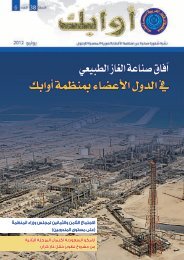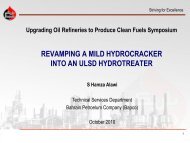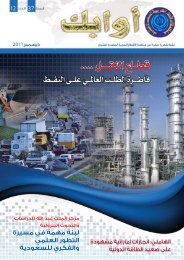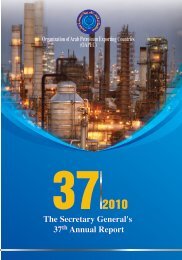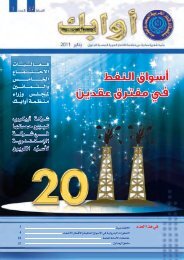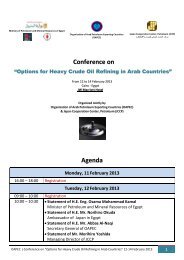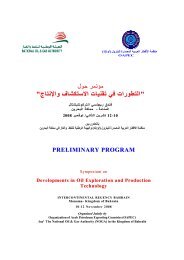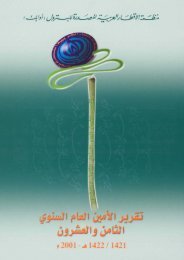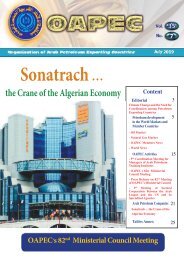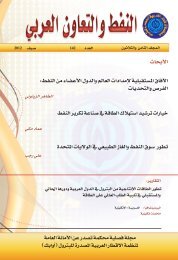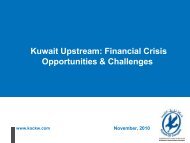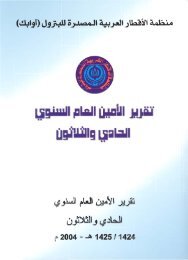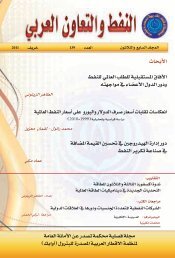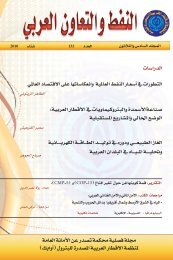chapter two - OAPEC
chapter two - OAPEC
chapter two - OAPEC
You also want an ePaper? Increase the reach of your titles
YUMPU automatically turns print PDFs into web optimized ePapers that Google loves.
PREFACE<br />
As the thirty-sixth Report rolls off the press, the repercussions of the global financial<br />
crisis are still casting shadows over the world economy, and particularly over the oil<br />
industry and its markets. It is true that supply/demand and prices are now relatively stable<br />
following the huge storm that affected them in the last quarter of 2008 and the first months<br />
of 2009. The fall in demand and prices severely affected the social and economic<br />
circumstances of the petroleum exporting countries in general. It particularly affected the<br />
Arab oil exporting countries, where petroleum is still a major national asset and the<br />
backbone of their economies, because it constitutes a principal source of revenue, a large<br />
part of their foreign trade, and an essential factor in their annual budgets.<br />
It is a fact that the petroleum industry plays an important role in the social and economic<br />
stability of many Arab countries, both exporters and other countries that benefit indirectly, either<br />
through worker remittances, trade, or bilateral or joint Arab projects. <strong>OAPEC</strong> members' revenues<br />
from oil exports in 2009 totaled just $352.8 billion, which was $232.5 billion (or 39.7%) less than<br />
in 2008, when they totaled $585.3 billion. In real terms, the 2009 revenues were no more than<br />
$278 billion in 1995 prices.<br />
The drop in revenues was due to the continued pressure of the global economic financial<br />
crisis on oil and natural gas prices throughout 2009, making them fluctuate. The annual average<br />
of spot prices for the OPEC basket of crude oils dropped 33.4% from $94.4/b in 2008 to about<br />
$61/b in 2009. The average basket price ranged from $42.9/b in the first quarter of 2009 to<br />
$74.3/b in the last quarter.<br />
However, the drop in revenues has affected more than the current economic position of<br />
Arab countries. It has also cut deeply into the projects for expanding crude oil production<br />
capacity that Arab countries had planned to meet the forecast rise in world oil demand in the<br />
coming twenty years. These projects have either been delayed or postponed until the local and<br />
global economies show signs of recovery.<br />
Just as the world financial crisis affected petroleum revenues and oil prices, it also affected<br />
natural gas. It had a negative impact on supply, demand and consumption as world economic<br />
growth declined. In the OECD countries it fell by 3.4%, in the countries in transition by 6.7%,<br />
and in Latin America by 2.5%. Only Asia escaped this fate, as it recorded a growth rate of 6.2%.<br />
As a result, world oil demand dropped 1.6% from 85.7 million b/d in 2008 to 84.3 million b/d in<br />
2009, or by about 1.4 million b/d.<br />
This Report presents and analyzes such issues from A to Z. It provides a clear picture of<br />
the various aspects of the petroleum industry and a more general picture of the energy industry. It<br />
highlights the efforts exerted by OPEC and its Arab member countries, which are also members<br />
of <strong>OAPEC</strong>, to mitigate the impact of the financial crisis on their countries. An outstanding<br />
example of these efforts was the participation of <strong>OAPEC</strong>'s General Secretariat, as an observer, in<br />
the Arab Economic and Social Development Summit, which was held in Kuwait, 19-20<br />
January 2009. The summit was held in the presence and under the auspices of H.H. Sheikh Sabah<br />
Al-Ahmad Al-Jaber Al-Sabah, Amir of Kuwait, and with the participation of the kings and<br />
presents of Arab states. The General Secretariat presented a study entitled, 'The Global<br />
Financial Crisis and Its Probable Initial Repercussions for the Arab Petroleum Industry,'<br />
which was adopted as a working document of the summit. The General Secretariat also took part<br />
in many activities of a similar vein, such as the First Gulf Conference on Investments in Oil, Gas<br />
and Petrochemicals during the World Financial Crisis, which was held in Manama, Bahrain, 20-<br />
21 October 2009. The Secretary General's speech to this conference concluded that 'investments<br />
in all phases of the oil industry require stable oil markets and guaranteed demand for oil.'



